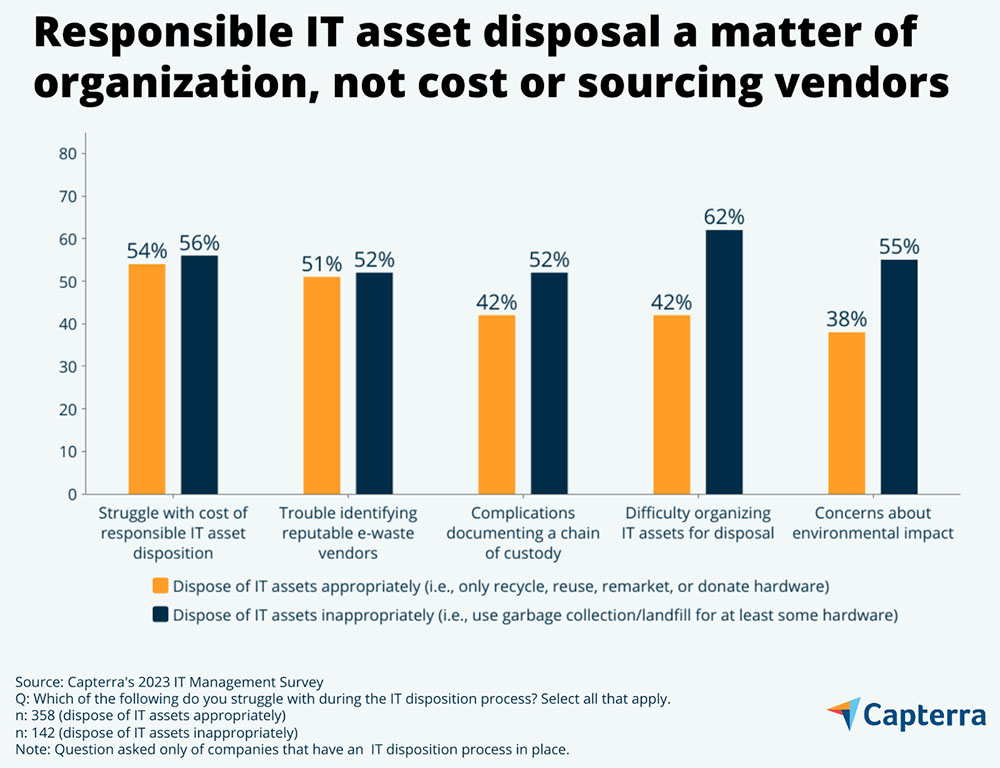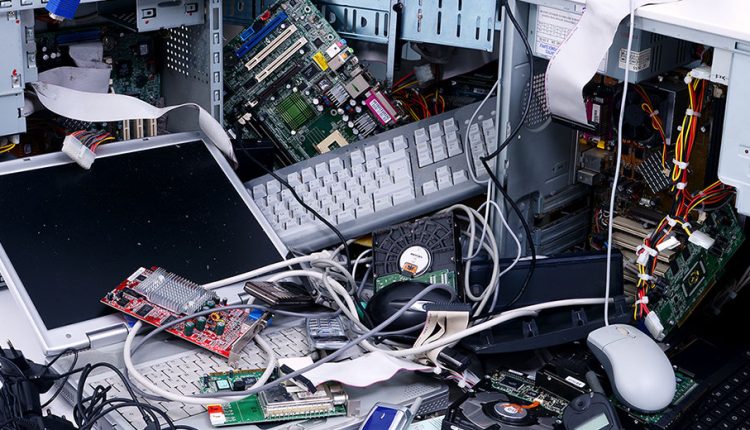Growing businesses often rush to upgrade hardware, which results in stockpiling unused computers, routers, and other IT assets. This practice can be a bad business strategy that leads to worsening security and environmental concerns.
In the 2023 IT Management Survey conducted by software and IT services firm Capterra, data from 500 IT professionals at U.S. small and midsize businesses (SMBs) shows that nearly a third (29%) engage in improper IT hardware disposal practices.
The research shows that SMBs typically hoard old computers for 2.7 years before grappling with what else to do with them. Even in the hybrid and remote work era, hardware pile-up remains a huge part of technology’s ongoing transformation.
Key findings of the Capterra report show that most companies recycle (80%), redeploy (65%), remarket (62%), or donate (54%) at least some of their IT hardware assets. However, many others resort to improper disposal that impacts negatively on the environment.
IT hardware devices often contain toxic chemicals that make them unsuitable for landfills or incinerators. These harmful elements are potentially devastating to the environment and people.
“There are serious environmental, legal, and regulatory implications of improper IT asset disposal, and businesses should, therefore, prioritize responsible disposition processes,” offered Zach Capers, senior security analyst at Capterra.
Disorder Drives IT Hardware Dumping Disarray
The ability to organize and stage IT assets for disposal is a critical factor in whether companies use proper or improper disposal practices.
Cost is not. Disorder — not cost — drives irresponsible disposition practices. Lack of organization is a challenge for 62% of SMBs inappropriately disposing of assets, compared to 42% of responsible disposers.
Far too many simply throw away no longer-used hardware. The research shows that companies engaging in irresponsible disposition practices are more likely to upgrade or replace hardware to scale their workforce, avoid obsolescence, and keep up with the competition.
Along those same lines, irresponsible disposers are significantly less likely to reuse older devices (54%) than responsible disposers (69%). Irresponsible disposers tend to have fewer total hardware assets yet are more likely to lose track of them.
According to the report, they also tend to have fewer years in business than companies that dispose of their older hardware more responsibly.
Organizations often default to on-site storage or commercial trashing due to limited awareness of e-waste regulations and the perception of convenience. While the report emphasizes that disorder, not cost, is the primary driver of irresponsible disposition practices, Mark N. Vena, CEO and principal analyst at SmartTech Research, counters that cost considerations also play a role.
“Also, concerns about data security and potential breaches have prompted hesitation in adopting new disposal methods. Cost considerations, lack of clear incentives for sustainable practices, and the absence of standardized processes also contribute,” he told TechNewsWorld.
Responsible vs. Irresponsible Computer Equipment Replacement
Understanding the cost considerations sets the stage for a deeper exploration into what differentiates responsible from irresponsible hardware disposal.
Capterra researchers have observed various ways companies struggle with organizing and staging their disposable assets. One significant finding was that environmental impacts are an important concern. Interestingly, this concern appears to be motivated more by guilt than by altruism.
For instance, companies that discard unwanted computer equipment must often verify a chain of custody, as industry regulations frequently require. That is a more challenging task proposition for those companies with organizing and staging issues.
On the other hand, both groups share similar struggles with the cost of responsible disposal and finding reputable e-waste vendors. So irresponsible disposal practices cannot be blamed on either issue since both groups face them equally, according to the report.

Rather, these two issues revolve around organizations deciding to take an easy — albeit illegal — way out to empty their cluttered hardware storage closets. The other side of the conundrum finds companies several years down the road shedding chaos in favor of proper IT asset disposition processes, according to Capterra.
The problem of IT hardware disposal is rapidly escalating in significance, Vena noted. Technological advancements lead to shorter hardware lifespans, so the volume of discarded devices is surging.
“Striking a balance between sustainable disposal practices, data security, and compliance with evolving regulations has become critical for organizations, governments, and society to address the growing environmental and cybersecurity concerns,” he warned.
Facing Costly Consequences
According to Capterra, deciding to recycle IT assets is only the first step. Companies must still ensure they complete the handoff correctly.
Environmental damages aside, irresponsibly disposing of IT assets can result in serious security and legal issues. Some states have strict rules about throwing away certain IT equipment and not safeguarding their digital contents.
In the U.S., some states slap offenders with stiff penalties for violating local and federal privacy laws. Europe strictly enforces similar regulations. Also, in the U.S., businesses must contend with industry regulations like HIPAA, GLBA, and PCI-DSS. These all regulate the specific handling of sensitive data when decommissioning IT hardware.
Companies must also be responsible when selecting established e-waste contractors with a proven compliance record with responsible data destruction and e-waste standards. Additionally, businesses should consider recycling programs by manufacturers or retailers from which they purchased their equipment.
Some companies prioritize cost-efficiency and convenience. Others might lack awareness about the potential environmental and security risks associated with improper disposal, observed Ron Edgerson, senior application security consultant at cybersecurity advisory services firm Coalfire.
“The complexity of responsible disposal methods, such as electronic waste recycling or hazardous material treatment, can discourage organizations from adopting them,” he told TechNewsWorld.
‘Collect and Dispose’ Scams Hamper Efforts
SMBs can too easily become attracted to disposal scams, warned the Capterra report. All too common are companies that collect payment while promising safe disposal. Instead, they ship the refuse to foreign countries or dump the hardware in poorly regulated landfills.
Edgerson added that a lack of acceptable disposal techniques exacerbates the IT disposal problem, significantly impacting both the environment and data security.
“As awareness of these issues increases, the importance of adopting sustainable and secure IT hardware disposal methods becomes paramount to mitigate the potential consequences of this escalating problem,” he said.
Vena suggested companies can choose certified data wiping services and employ techniques like degaussing or shredding to ensure data eradication. Collaborating with e-waste recyclers that adhere to legal frameworks and offer secure data disposal is pivotal.
“This balance between sustainable disposal practices and data security is essential for businesses navigating modern compliance landscapes,” he said.
Workable Options Exist
SMBs and large enterprises have various choices for disposing of enterprise-grade IT hardware other than on-site storage or commercial trashing, continued Edgerson.
Recycling and refurbishment are ecologically friendly methods of extending the life of the equipment. Donating to non-profit organizations, schools, or communities in need is another worthwhile alternative.
“Choosing IT asset disposition (ITAD) firms that specialize in safe data wiping and environmentally friendly disposal procedures may give peace of mind while following legal and ethical norms,” he recommended.
These choices not only handle hardware disposal problems. They also adhere to sustainable practices and data protection standards, resulting in more responsible IT lifecycle management, Edgerson noted.
The Need for Stepped-Up Regulations and Enforcement
Given that nearly one-third of companies do not sell or donate their discarded IT hardware, better enforcement and regulation are probably the best solution, concur Vena and Edgerson.
“That could encourage organizations to adopt more responsible practices. This could ultimately address both environmental concerns and data security issues associated with improper disposal of enterprise-grade IT hardware,” offered Vena.
Edgerson sees a holistic approach involving enforcement and adequate regulation as a viable solution. While enforcement tools are important in guaranteeing compliance, clear and well-defined laws establish the groundwork for enterprises to practice responsible disposal.
“By combining effective enforcement, awareness programs, and compliance incentives, companies and the environment may benefit from a more sustainable and ecologically conscientious approach to handling abandoned hardware and waste,” he said.
Industry Controls Alone Not Enough
Simply enhancing compliance support through cross-industry initiatives is unlikely to be adequate. There is a lack of standardization in self-regulation efforts across different sectors, and various industries have differing levels of authority when enforcing hardware management guidelines.
“Some sectors, like health care and finance, face stringent regulations due to sensitive data concerns. In contrast, industries with less regulatory oversight might have more flexibility,” explained Edgerson. “However, as environmental and data security awareness grows, industry-led initiatives and standards are emerging.”
Industries can influence their members. But comprehensive and consistent regulations from government bodies remain crucial to ensuring responsible and uniform hardware disposal practices across sectors, he concluded.
Vena agreed that strengthening state and federal disposal regulations could indeed be a viable solution.
“This could ultimately address both environmental concerns and data security issues associated with improper disposal of enterprise-grade IT hardware,” he said.
Read the full article here

